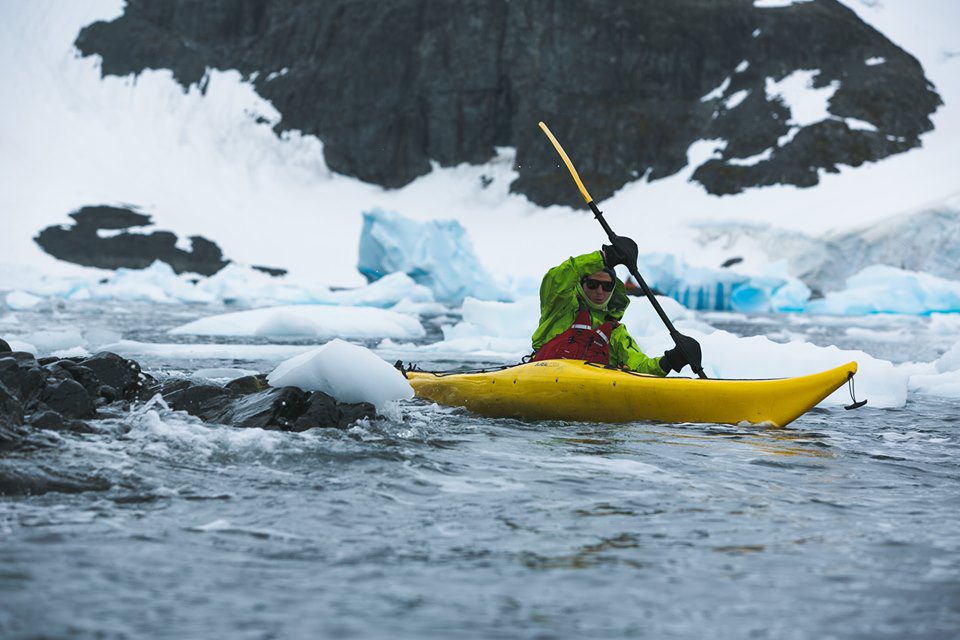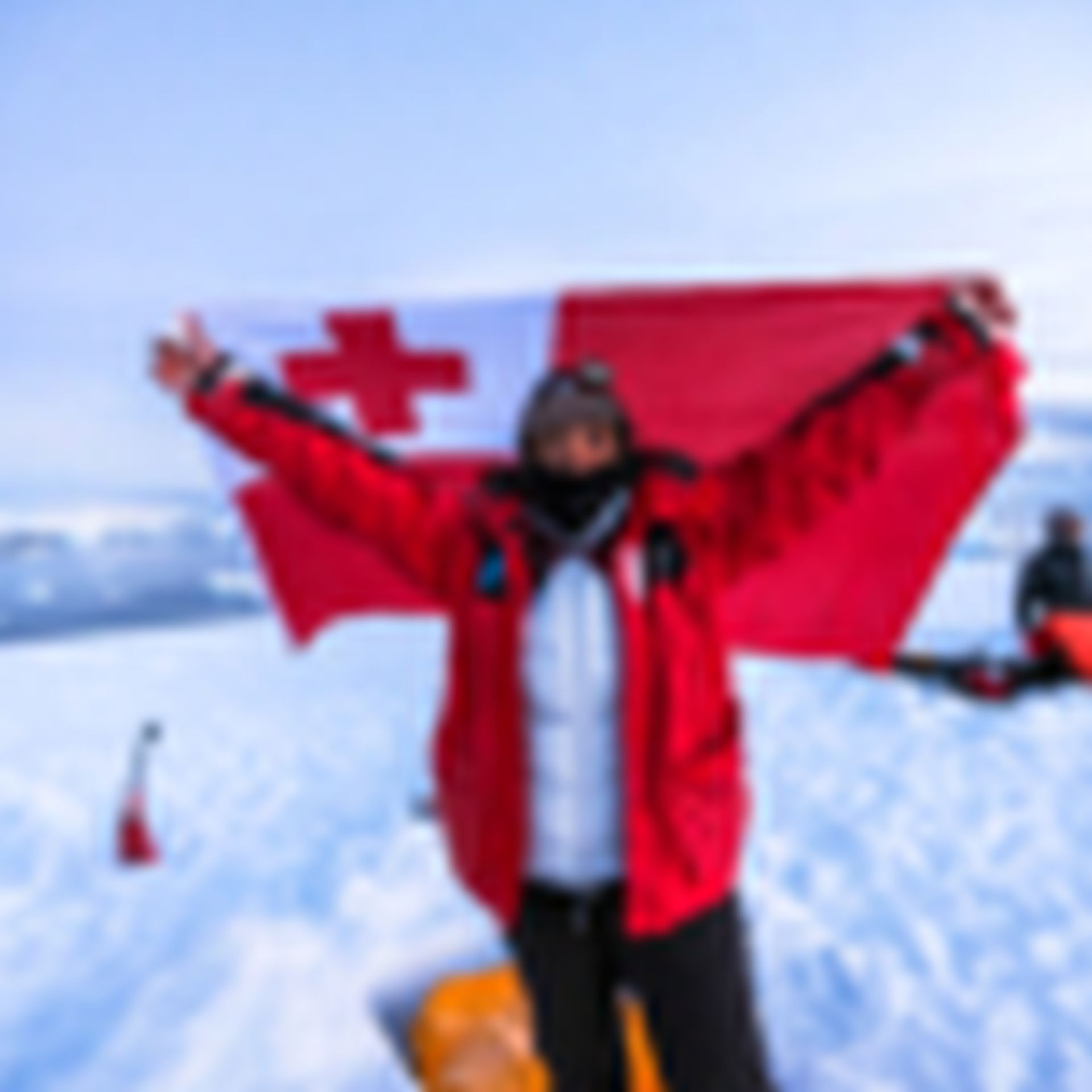Wildlife and Calving Ice
What was your favourite part of the trip?
I really enjoyed the structure of the trip. It was amazing to be part of something different from what we normally do when we go on an expedition with a team of kayakers. We were a much bigger group but everyone brought something into the scene that was amazing. There was a really strong connection between everyone all the time we were on the boat and in the kayaks. It was a really healthy, positive environment to be in. And then you combine that with where we were in the world in the Antarctic Peninsula and to be inundated with insanely amazing things all day, all the time. It was really special for me.
 Antarctic Heritage Trust/Alexander Hillary
Antarctic Heritage Trust/Alexander Hillary Mike Dawson kayaking in Antarctica
The highlight moment for me though was one really magical day. We had camped out overnight on the ice and woke up at Portal Point on the Peninsula, sun coming up making it just such a surreal place to start the day after a starlit night. It was just such a soulful and pure moment that kicked off this incredible day. In the morning we kayaked around a shipwreck that was quite spectacular, and then in the evening we had another excursion where we had so many encounters with whales. It was a small group of us, and there were more whales than people. You could feel there presence, you could hear them breathing, you could see them aware that we were there in the water with them. For such a massive powerful creature they are so powerful. So the opportunity to be so close to something that is so big, so raw and so much a part of Antarctica, and to do it from a kayak where you are just something so small, next to something so big was an incredible experience.
Camping on the ice really got me back to the roots of why I do what I do. Getting away from the buffet and the comfort of the ship and just enjoying sitting in the snow. When you kayak somewhere like we did to Portal Point, you kayak away from the boat, climbed up the hill in our dry suits – that’s what an expedition is like – you go out there and explore from A to B to C and you take your stuff, you’re self sufficient so you can camp out in the wilderness and just enjoy it.
You were travelling more than a century after the early Polar explorers who first visited the continent. How would you compare your experience with theirs, what would the similarities and differences be?
I think that it’s impossible to compare our expedition with the Heroic Age of Antarctic Exploration. While we headed into the unknown, we had the comfort of a ship, food, GPS, Search and Rescue. But, I think the most important part was that it gave us such a huge amount of respect for what they had accomplished heading towards the South Pole over 100 years ago with little idea or resources at their disposal highlighting the immense risks that they undertook for exploration and scientific discovery.
What did you feel about the group dynamic considering you were mentoring them out in kayaks in the water?
One thing I took away from the trip was that considering we had spent so little time together, everyone was so amazing, as a group, as individuals that everyone got along, and there were no issues along the way. Just so fantastic to be part of such a cool group of Kiwis, and to be doing something so amazing.
On the mentoring side of things it was also an easy job because everyone was just so fired up and excited to get out there and see what was on offer out there, and see and do as much as they could. It was hugely satisfying to watch Mele and Lana grow over the 10 days, soak it all up eager to see what’s at the bottom of the world.
What went through your mind when you were arrived back in Ushuaia after 10 days aboard the Akademik Ioffe?
I could have stayed down their for another year. I was really happy that everything had gone well, and that I’d had the opportunity to spend the time with this team, learn from them and hear about their stories, and then share this epic trip. When we landed back in Ushuaia it was a moment to just pause and take in everything that we had accomplished in those 11 days on the boat in terms of distance covered, crossing the Drake Passage, being exposed to so many different parts of the Peninsula even though we just saw the tiniest piece of Antarctica itself. We saw a lot of amazing things. We saw so much wildlife, we saw historic sites and stunning scenery all the time.
What was something you experienced that was different to your expectations?
I’d been told that it’s big and that it’s hard to describe. What I came away with was that it is hard to describe what you see there. There are so many things that that if you took them away individually and put them in another environment they would each be spectacular on its own merits, but they are all in one huge landscape. Everywhere you look, there are glaciers flowing into the ocean, you’ve got whales, beautiful pristine water, mountains in the distance, and we are just seeing what is along the coastline – everything is just massive. It makes everything else you’ve ever seen, tiny.
What would you say to people who might be interested in applying for future expeditions?
It was fantastic to see the group come together to engage with the spirit of exploration. A group of young Kiwis heading out on an adventure to create something amazing and use what they learnt to change other people’s lives by sharing their stories – it’s a really cool journey to be part of. To see Mele and Lana grow through the process and how inspired they were by the whole experience was very rewarding. I would recommend that anyone who gets the opportunity apply. It’s a huge privilege to go there and come back and share that story with other people.
What did you learn or discover about yourself?
It definitely reminded me that it’s important to switch off and explore where you come from. It’s important to make sure you are aware of yourself as part of a team, and making sure that team is healthy, happy and safe, as well as ensuring the culture is strong. I did learn lots from the team. When you go on an expedition with people that are all at the top of their game everyone is very independent. But when you go on an expedition where things are new for a lot of people, it’s cool to see the sharing of knowledge. You need to slow down and take time to make sure everyone is learning, and growing, are safe and happy.
When you go out and share your story, what will be the thing you want to share most?
Often my role in mentoring or sharing my story is really short. I go somewhere and spend 20 minutes, an hour or a day with someone but you never really know the impact your story might have on someone else and whether they will connect with it. However being able to spend two weeks with people you can really share your story and talk to them about what you’ve done, and they can share what they’ve done, what they want to do and where they want to go. That gave me the opportunity to really help them with how they can achieve these goals. The extra time let me grow the relationship and make it stronger.
How different was the kayaking from what you are used to – what did you need to do differently?
It’s quite hard to compare the difference between whitewater river kayaking and flat water ocean paddling. In-terms of what we did differently on this expedition we were returning to a base each day and travelling by boat to explore a completely new part of Antarctica each expedition out from the ship. In a whitewater kayaking trip it is very much point A to point B. It was also significantly colder than any other kayaking I had done which meant a lot more gear. Finally, it was a new experience for a lot of the team which meant making sure everyone was comfortable with getting out there.
In terms of adventure, what piqued the adrenaline for you?
Wildlife and calving ice. There’s nothing more breath-taking than the sound of a gigantic glacier calving. Eyes rapidly trying to find out where it was as everyone searched for where the sound had come from. It was incredible stuff. The whale encounters were phenomenal. They are such massive creatures but move with such precision. It’s remarkable to see their power as they swim nearby.

 Antarctic Heritage Trust
Antarctic Heritage Trust